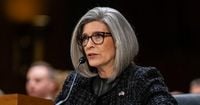Senator Joni Ernst of Iowa, a prominent Republican and the first female combat veteran to serve in the U.S. Senate, is poised to announce next week that she will not seek reelection in 2026. Multiple sources familiar with her plans confirmed to CBS News and other outlets that Ernst, 55, has wrestled with the decision for months but has now begun informing friends and confidantes. Her formal announcement is expected on Thursday, September 4, 2025, marking the end of an era for Iowa’s political landscape and opening up a fiercely contested Senate seat in a state that has swung between the parties over the past decade.
Ernst’s retirement comes at a pivotal moment, not just for Iowa, but for the national political scene. As reported by The New York Times, her decision adds to a growing list of high-profile Senate departures ahead of the 2026 midterms, including Republicans Mitch McConnell of Kentucky, Thom Tillis of North Carolina, and Tommy Tuberville of Alabama. On the Democratic side, senators such as Dick Durbin of Illinois and Gary Peters of Michigan are also stepping down. This wave of retirements is reshaping the battle for control of the U.S. Senate, where Democrats need to gain four seats to reclaim a majority.
Ernst’s career has been marked by a blend of military service, political ambition, and a knack for headline-grabbing moments. Raised in rural southwestern Iowa, she graduated from Iowa State University before joining the Army reserves. After tours in Kuwait and Iraq, she retired as a lieutenant colonel in the Iowa Army National Guard. Her entry into politics saw her serve in local and state government, culminating in her 2014 election to the Senate, where she quickly rose to become one of the highest-ranking Republican women in Congress, according to CBS News.
Throughout her tenure, Ernst has been a reliable vote for President Trump’s agenda, even being considered as a potential vice presidential pick in 2016. However, the last year has proved particularly challenging. Shortly after the 2024 election, she lost a bid for a Senate GOP leadership post and was rumored to be in contention for the role of defense secretary—a position that ultimately went to Pete Hegseth, whom she supported despite his controversial record. In March 2025, ProPublica published unconfirmed allegations regarding Ernst’s personal relationships with military officials who lobbied her committee. While her spokesperson insisted she maintained her independence, the episode added to the difficulties Ernst faced in her final year.
Perhaps most damaging was a town hall incident in May 2025, when Ernst responded to concerns about Medicaid cuts included in the sweeping One Big Beautiful Bill Act. When a constituent warned, “people are going to die,” Ernst replied, “Well, we all are going to die,” a comment that quickly went viral and drew harsh criticism from Democrats and some Republicans alike. As The New York Times noted, the remark was seized upon by Democratic challengers eager to paint her as out of touch with constituents’ concerns.
Despite speculation and mounting pressure from both within her party and the White House—who hoped she would run again—Ernst has told those close to her that she always intended to serve only two terms. According to CBS News, she believes she has accomplished what she set out to do and is ready to transition to the private sector. Her approval rating has slipped below 40 percent, and she has faced threats of a more conservative primary challenger, further complicating the political calculus.
The announcement of Ernst’s retirement has already set off a scramble among both Republicans and Democrats eager to fill the vacuum. On the Republican side, Representative Ashley Hinson—a third-term lawmaker whose district covers much of northeastern Iowa—is widely expected to enter the race. National Republican officials have long viewed Hinson as a strong candidate, and with Ernst stepping aside, her path to the nomination seems increasingly clear, as reported by Politico.
The Democratic field is notably crowded and diverse. State Representative Josh Turek, a Paralympian wheelchair basketball player, and state Senator Zach Wahls have both declared their candidacies, alongside Des Moines School Board chairwoman Jackie Norris and Knoxville Chamber of Commerce executive director Nathan Sage. Norris, in particular, brings national experience, having served as chief of staff to former First Lady Michelle Obama. Democrats are buoyed by recent successes, including a special election victory in a conservative state Senate district this year, pointing to it as evidence that the tide could be turning in Iowa. “Republicans begged Joni Ernst to run for re-election because they know that her retirement deals another blow to their chances,” said Maeve Coyle, a spokeswoman for the Democratic Senatorial Campaign Committee, in a statement to The New York Times.
Yet, any Democratic optimism must be tempered by Iowa’s recent political history. The state, once a crucial swing state won twice by Barack Obama, shifted sharply right in 2016 and has remained firmly in the Republican column since. Donald Trump carried Iowa by eight points in 2020 and widened his margin to thirteen points in 2024. Republicans currently hold both Senate seats and all four Congressional seats in the state. A Democrat has not won a Senate race in Iowa since Tom Harkin’s re-election in 2008, making the 2026 race an uphill battle for the party.
Nationally, the stakes are high. With the Senate so closely divided, each open seat becomes a potential tipping point. Democrats are targeting not just Iowa, but also Maine—where Governor Janet Mills is considering a run against Republican Senator Susan Collins—and North Carolina, where a popular former Democratic governor is running for an open seat. Even if Democrats managed to win in all three states, the party would still face an uphill climb to reclaim the majority, with Vice President JD Vance holding the tiebreaking vote if the Senate splits evenly.
For Iowa voters, Ernst’s departure marks the end of a chapter defined by her military credentials, her rise in Republican leadership, and her sometimes blunt, always headline-ready style. As the state prepares for a wide-open contest to replace her, both parties are gearing up for a bruising campaign that could have national implications. The outcome will not only determine the direction of Iowa politics but could also help decide which party controls the U.S. Senate in 2027 and beyond.
As candidates line up and campaign rhetoric heats up, all eyes will be on Iowa—a state whose political winds have shifted before and may yet again.



